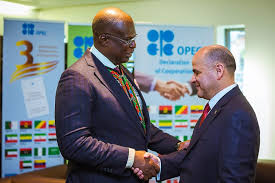There are no products in your shopping cart.
| 0 Items | £0.00 |


NIGERIA is poised to enjoy a mini revival in her economic fortunes as the Organisation of the Petroleum Exporting Countries (Opec) and its allies are set to increase their combined output by 2m barrels per day from August to December to meet recovering demand.
Following the collapse in global crude oil consumption in the wake of the coronavirus pandemic, Opec and its allies decided to cut production significantly. This meant member states were asked to reduced their output, with Nigeria for instance compelled to cut its daily output to 1.77m barrels per day (bpd) barrels from 2.5m barrels bpd.
Over recent months, however, there are signs that the marker is beginning to stir as global economic activity returns to normal and demand picks up again. In April, Opec ministers met and agreed to ease back on their production cuts, endorsing previously agreed plans to boost crude oil output.
Oil producers known as Opec+, intend to pump some 2m barrels of extra crude oil per day, with the most of it coming from Saudi Arabia. They began online meetings yesterday and the alliance’s joint committee, recommended the group should add 400,000 bpd each month from August to December.
In addition, the panel also suggested the expiry of the supply-cuts agreement be extended to December 2022. If agreed, the alliance’s collective production cuts would shrink by about one-third by the end of the year to about 3.76m bpd, from July’s 5.76m bpd.
Responding to oil demand destruction caused by the Covid-19 crisis, Opec+ last year agreed to cut output by almost 10m bpd from May 2020, with plans to phase out the curbs by the end of April 2022. Oil prices extended gains on news of the latest increase plans because some traders had expected a bigger output rise in August.
For instance, the international oil benchmark, Brent crude, rose by $1.39 to $76.01 per barrel as of 7:52pm Nigerian time yesterday. UBS analyst Giovanni Staunovo, said the proposed increase would keep the market tight this summer, with further rising demand expected over the coming weeks.
An Opec+ technical panel had said it expected oil demand to grow by 6m bpd in 2021 but flagged risks of a glut in 2022, saying there were significant uncertainties including an uneven global recovery and rising cases of the Delta variant of the coronavirus. Saudi Arabia, Russia and other Opec+ members have been cooperating closely since their big falling out in March 2020 just before the pandemic sent oil prices crashing, which drove them back together to forge their supply pact.